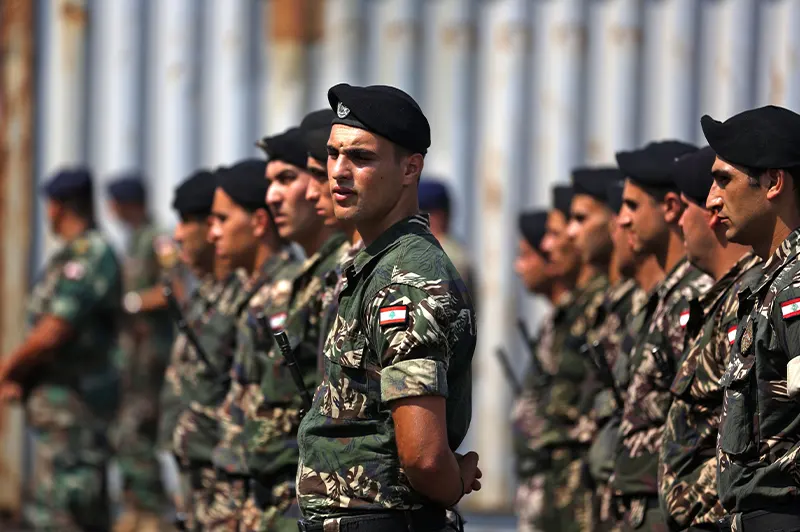After nearly 6 months of submitting demands and escalating actions by public administration staff and retired military personnel, the Council of Ministers on February 28th approved a series of salary increases. However, this resolution did not settle the issue, as the new salaries do not align with the inflation rate and the cost-of-living increases. Moreover, the primary demand of the employees and retirees is establishing a new scale for ranks and salaries.
In the details, active-duty and retired military personnel were granted three additional salaries, with the increase not falling below 8 million Lebanese pounds, plus a driver allowance for retired officers entitled to a driver, set at 5 million Lebanese pounds. Administrative employees were awarded two salaries, and a monthly performance-based bonus, alongside a daily attendance allowance fluctuating between 8 and 16 gasoline coupons, based on a maximum of 14 workdays per month, conditional on no absences. Consequently, the salary range for the public sector, encompassing both active-duty personnel and retirees, is between approximately $400 and $1,200. It’s important to note that the salaries will be calculated retroactively from December 2023.
Speaking to “Al-Modon” newspaper, one retired military individual remarked, “While salaries have seen an increase, they still fall short of reflecting the soaring cost of living, aligning with the prices of goods and services, including medical and hospitalization expenses, and do not fulfill our demands.”
Retired military personnel reject the pay increase…
Elsewhere, the Association of Retired Military Personnel has voiced its rejection of the pay raise awarded to retirees, citing its insufficient value and in comparison, with what was granted to public administration employees. The association stated, “The government convened yesterday, exploiting the goodwill of the retired military personnel to ostensibly address the issue of salaries and wages in a fair manner that benefits all. However, after issuing its decisions on this matter, it became apparent that the government did not consider the most basic principles of justice and equality, nor the dire social and living conditions suffered by military and retired public employees. We hereby declare our refusal of the pay increase for retirees due to its paltry amount and in light of its comparison to what was provided to public administration employees under misleading pretenses such as transportation and productivity allowances. The retirement pay has been reduced to about 60% of the salary of their counterparts in active service, of the same job category and rank, which contradicts the National Defense Law and the Retirement and Discharge Regulations that clearly stipulate the aforementioned percentage at 85%. This constitutes a blatant breach of the law, which the authorities ought to exemplify in their adherence, not undermine at their convenience.”
An eightfold increase in the Lebanese pound and a sevenfold decrease in the dollar.
Information International released a report on the actual costs of retirement pensions and end-of-service benefits in the public sector. According to Information International, the cost of retirement pensions and end-of-service benefits in the public sector for the year 2024 is projected to exceed 24 trillion Lebanese pounds (24,596,000,000,000 LBP, approximately 274.8 million US dollars, based on the exchange rate set by the Ministry of Finance as of February 23, 2024).
With the onset of the currency crisis in 2020, the cost of retirement pensions and end-of-service benefits was about 2.983 trillion Lebanese pounds, equivalent to roughly 1.9 billion US dollars at the time. This represents an 824 percent increase in the total cost in Lebanese pounds and a sevenfold decrease in dollar terms.
It should be noted that this figure includes the public sector, excluding public institutions and autonomous agencies, which finance compensations from their own budgets. These entities do not receive retirement pensions but are compensated for end-of-service from the National Social Security Fund.
Zeina Akar… among the foremost advocates for military personnel rights
Since her appointment as Minister of Defense in Hassan Diab’s government, Zeina Akar has been notably committed to the welfare of military personnel, along with maintaining ongoing communication with soldiers and officers. In an inspection tour in 2020 to several units and brigades of the Lebanese Army, Akar extended her gratitude to the army—its leadership, officers, and soldiers—for “their efforts in the recent period,” highlighting that “confidence in the military institution is Lebanon’s assurance of stability.”
In a dialogue with the Asas website, Akar underscored the significant value of ground-level communication, stating, “Engaging with people matters greatly to me. Direct interaction with officers and army personnel is beneficial as it reassures them of the presence and attention of their superiors, and of our interest in hearing them out. This perspective has informed much of my work at the Ministry of Defense, guided by insights from field visits.”
Throughout her tenure, Akar facilitated the deferral of housing loans and mutual fund payments for military staff for one year. In a media interview, Akar shared, “My firsthand experiences with military personnel on the ground revealed the critical nature of these concerns. Consequently, I would return to the ministry and promptly initiate discussions with relevant parties, such as banking associations and banks, who were cooperative and swift in addressing these issues.”
Despite Zeina Akar stepping down from her political role, she continues to fulfill her mission in educational and reform initiatives through her engagement in human development, particularly focusing on women, and through her leadership at the Nabu Museum in northern Lebanon. Akar holds the view that cultural awareness plays a pivotal role in freeing societies from their crises. Notably, the Nabu Museum is not merely a conventional museum displaying art and historical artifacts; it also serves as a venue for dialogue, art, and culture, highlighted by the continuous hosting of cultural and artistic events within its domain.
Summary:
Following approximately 6 months of escalating demands and actions by public administration staff and retired military personnel, the Council of Ministers sanctioned a series of salary hikes. However, these increases did not satisfy the retired military, who criticized them as insufficient. The question remains: Will the streets of Lebanon see new movements for demands?


